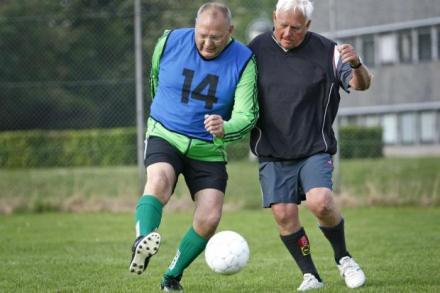When a doctor's solemn advice is to workout or exercise frequently, the mandate can easily be viewed as necessary drudgery. You might not want to do it, but since remaining sedentary is not an option and you know you must – it's off the couch and begrudgingly into the gym you go.
However, what if that mandate was to go out and play?
Specifically, to lace up your sneakers for soccer practice and take part in the training that went with it? If that sounds appealing, adults with "lifestyle diseases" such as type 2 diabetes and hypertension might want to consider this approach.
That's because a new European study has determined that soccer training is "an effective and multifaceted training type with a great potential for simultaneous broad-spectrum improvements in cardiovascular, metabolic and musculoskeletal fitness," according to a statement announcing the findings. To be clear, this referred to training and exercise related to soccer, but not the actual playing of games, meaning significant soccer skill is not required.
 On Jan. 26, the British Journal of Sports Medicine will publish a meta-analysis concluding that for those not previously trained in football (known as soccer in the U.S.), engaging in one hour of workouts twice a week for 3-to-6 months is beneficial for oxygen intake, while lowering fat mass, LDL (aka "bad") cholesterol and resting heart rate, or RHR. It's also effective for those with mild-to-high blood pressure aged 30 to 70 years old.
On Jan. 26, the British Journal of Sports Medicine will publish a meta-analysis concluding that for those not previously trained in football (known as soccer in the U.S.), engaging in one hour of workouts twice a week for 3-to-6 months is beneficial for oxygen intake, while lowering fat mass, LDL (aka "bad") cholesterol and resting heart rate, or RHR. It's also effective for those with mild-to-high blood pressure aged 30 to 70 years old.
"After 10 years of research, the evidence is now sufficiently strong to state that football is medicine," states Peter Krustrup from the Department of Sports Science and Clinical Biomechanics at the University of Southern Denmark. "Football training is an intense, effective and versatile type of training that combines HIIT (or high intensity interval training), endurance training and strength training."
Data from 31 previous scientific studies were included in the meta-analysis.
The training being promoted is comprised of a warm-up, then exercises focusing on strength, dribbling and balance, followed by informal 5-on-5 scrimmages – which are not competitive. Researchers wrote that this "can be played by all, regardless of age, gender, level of football experience and physical fitness."
The study's findings, it would seem, don't benefit Americans as much as they might for those in soccer-centric countries.
In Europe, soccer has been stitched into the fabric of society for hundreds of years, while on a practical level this training is harder to find in the United States. That's not to say it can't be found, given soccer's growth in America over the past couple decades. But for those with little exposure to the sport and who are mostly untrained, let's not say it's a simple task either. However, all in all, the findings, which provide a more entertaining way of improving one's health, are encouraging.
"The present meta-analysis demonstrated multiple broad-spectrum positive physical health effects of recreational football training in comparison with no-exercise controls, including beneficial effects on blood pressure, RHR, fat mass, LDL cholesterol and CMJ [counter movement jump] performance," the authors concluded. "In addition, it was evident that the majority of these effects occurred independently of age and gender, and most of the effects," they added, "occurred after only 12 weeks of training."




